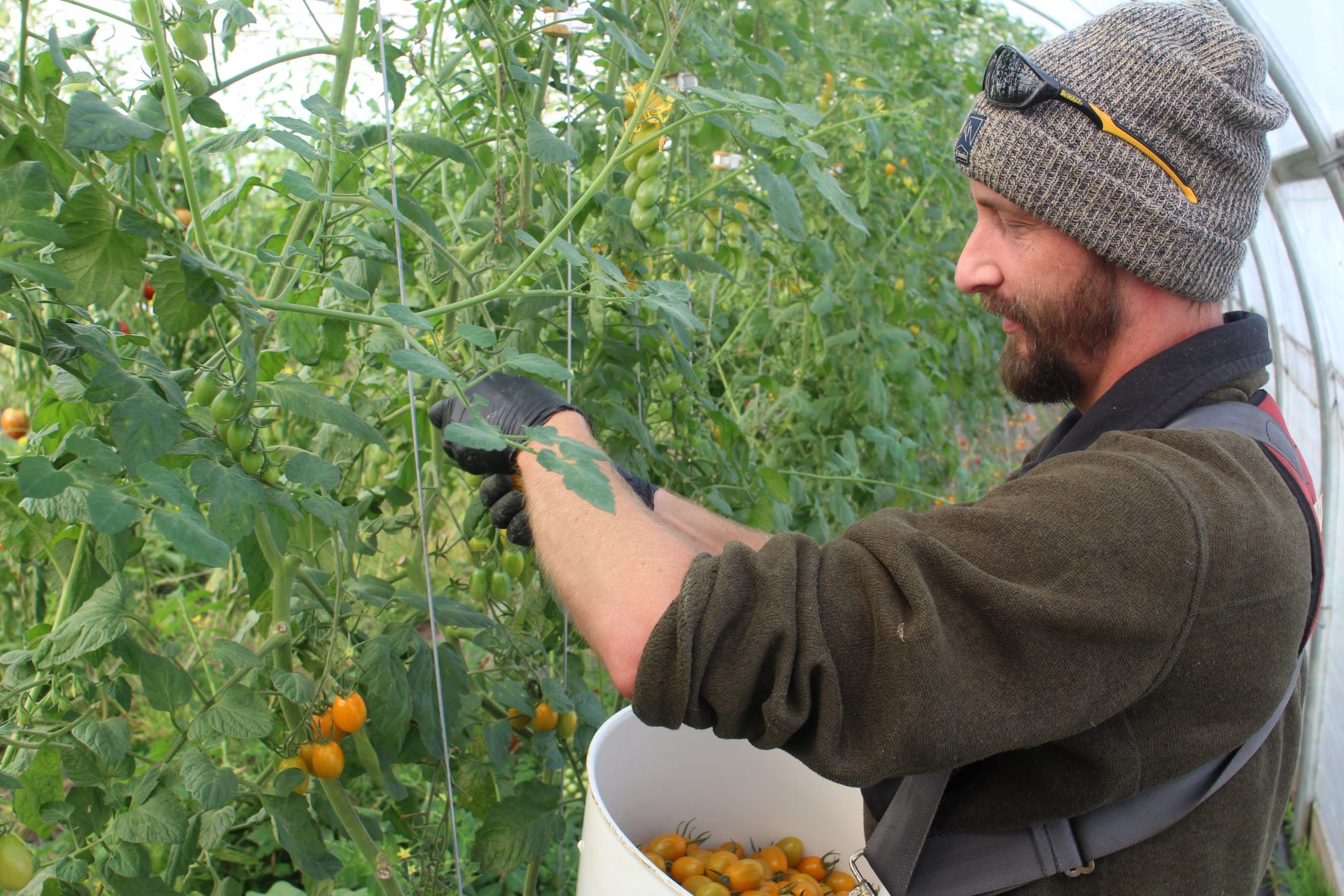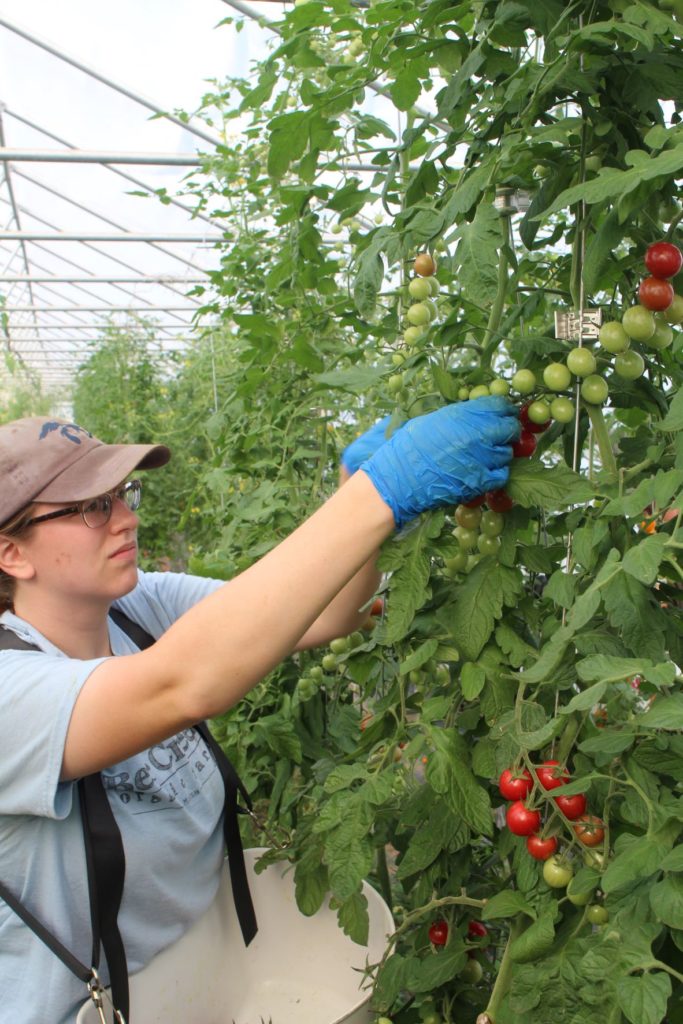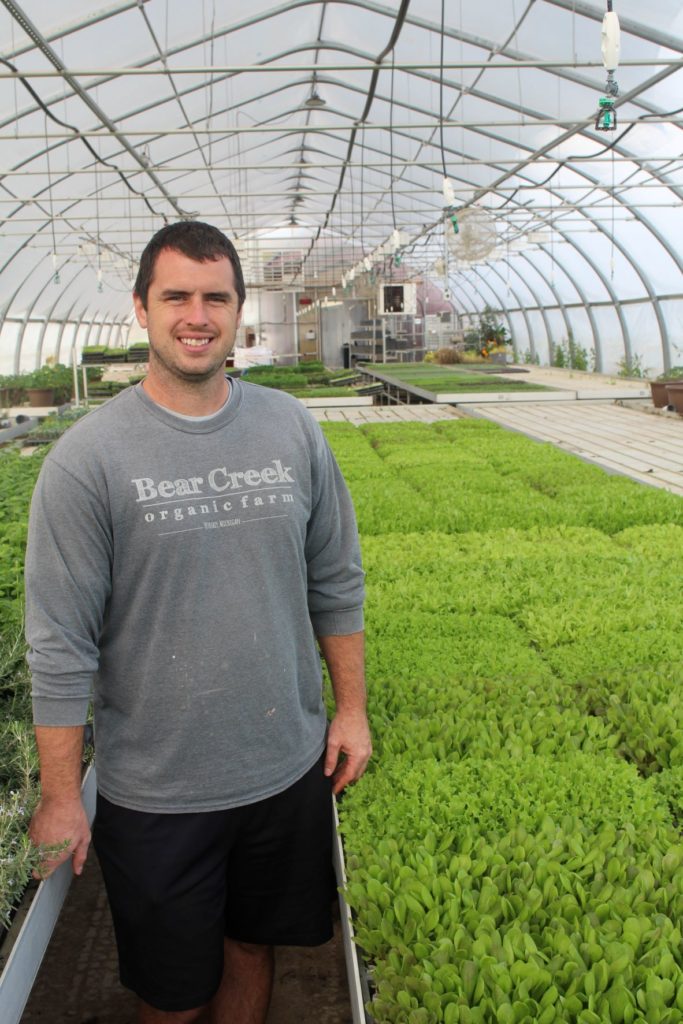
Nov 7, 2022
Food with a story
Concerns about climate change brought Anne and Brian Bates north to Petoskey, Michigan, located on Lake Michigan’s Little Traverse Bay. “We wanted an abundance of water and a cooler climate,” Brian said.
Coarse-textured soils and short, steep hills are predominant, and Anne and Brian were able to buy a fallow pasture that could be immediately certified as organic. The pasture was in Bear Creek Township and became Bear Creek Organic Farm.
The two started in 2013 with honeybees and garlic. This soon led to
salad greens, which had a shorter turnaround time to market. The honey was sold on the artisan market as premium, raw honey.
Organic start
The start into organic farming was born out of a concern for the environment. “It felt like there were a lot of problems that needed solving,” Brian said. “We couldn’t fix all of them but maybe in organic farming, there would be a way to touch on the key issues.”
Tomatoes soon started being grown in the greenhouse. Microgreens ― which became a farm specialty ― came in as a way to offset the heating costs of starting the tomatoes early in the spring. “It was an “aha” moment when we realized we could sell microgreens,” Brian said.
The Hoophouse for Health program of the Michigan Farmers Market Association brought the first hoop house to Bear Creek Organic Farm. Another hoop house came from the High Tunnel System Initiative of the Natural Resources Conservations Service’s Environmental Quality Incentives Program.
Most of the organic production was sold to farm markets and the wholesale market. Then, in spring 2020, came COVID and market uncertainty. “We started our own farm market because we weren’t sure what we would do,” Brian said. Cheeses, spices, maple syrup and other products from other farms are also sold, but the product choice is selective.
Go local
Products that are organic and grown locally by other farmers have the highest priority. “Food with a story is the next priority,” Brian said. “This could be someone we met who had a product. It all comes down to relationships.”
The results brought a total shift in the business model of Bear Creek Organic Farm away from the wholesale markets. Pre-COVID, the farm sold 70% of its production to the wholesale market. The vast majority was sold to independent grocery stores. The other 30% went to direct sales and the farm generated about a half million dollars per year.

harvesting, are still the most important but the shift to direct sales
has meant growing smaller amounts of a wider selection. Photos: Dean Peterson
By 2022, the farm was more than 80% direct sales and less than 20% wholesale. The value of the sales had doubled to more than $1 million.
“We don’t want things to happen to us; we want to make things happen,” Brian said. Despite the many difficulties COVID brought, it also brought possibilities if growers could capitalize on them.
About a quarter of the farm market sales are organic transplants in the spring. The Bear Creek Organic Farm Lookbook is the catalogue that describes the many types of herbs and vegetable transplants available, as well as fruit and flowers.
Growing small with wider selection
“We used to grow a lot of a few things — microgreens, salad greens and tomatoes,” Brian said. Salad greens and tomatoes are still the most important but the shift to direct sales has meant growing smaller amounts of a wider selection. Customers are emailed a description of what’s available every week.
The farm has grown to three greenhouses and seven hoop houses. This lets people come in and pick their own organic transplants in the spring. “We like to say, ‘We’re open for shopping’,” Brian said.
Most of the microgreens go to the farm market, independent stores and restaurants. They deliver to the stores and restaurants pick up. It all depends on the location and the quantity being delivered.
Growing microgreens takes a solid plan and consistent execution. “We seed
twice every week, harvest microgreens six days a week, and do that for 46 weeks a year,” he added.
Basil microgreens are a big, summer crop. Pea shoots, arugula, mustards and mizuna microgreens are also important. “Mizuna has more flavor than lettuce and less than arugula,” Brian said. Bear Creek also sells microgreen salad mixes, both a mild mix and spicy mix.

The farm has seven year-round, full-time employees and seven to eight part-time. It is definitely easier to find and retain employees on an organic farm. “We find people want to come work at an organic farm because they want to be part of the solution,” Brian said. “They like being productive and doing something with their hands because it has meaning.”
“We’ve never posted a job,” he added. “People have already made the effort to seek us out. There’s a really strong sense of purpose here and that goes with community engagement.”
Community engagement
Community engagement works at many levels. The USDA organic certification was the start. It was followed by the Real Organic Project certification. That was followed by Bear Creek Organic Farm becoming the first farm in Michigan to achieve B-Corp Certification.
“B-Corp is an elective, third-party analysis that speaks to the whole farm,” Brian said. “It’s a multi-faceted process and is the highest standard of business entity assessment.”
The B-Corp designation means the business has high standards of performance, accountability and transparency. Some of the factors assessed are the treatment of employees, the business’s effects on the environment, how products are marketed and supply chain practices such as whether inputs are bought from a local supplier.
“The biggest thing we’ve done is become a certified B-Corp,” Brian said. “You need to walk the talk and to really connect with the community on agriculture.”
Bear Creek Organic Farm’s transplant containers, propagation flats, microgreen clamshells, paper shopping bags, and packaging boxes, flats and cartons are made of recycled material and are fully recyclable. Local, or at least in-state, suppliers are preferred. The farm market’s ‘plastic’ produce bags are 100% plant-based and 100% biodegradable in normal compost piles.
The beehives aren’t shipped south for the winter. The bees stay on the farm 365 days a year.
“’Good food happens here’ is what we like to say,” Brian said. “We want to be an example of what’s possible ― to do the things people think that can’t be done. We want to be part of a community that people want to be proud of.”
Top photo: It is definitely easier to find and retain employees like Stuart Neils-Kraft on an organic farm. People often want to work at an organic farm because they want to be part of the solution.









